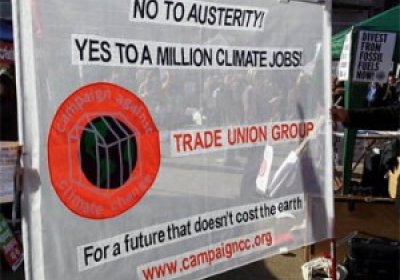Prime Minister Tony Abbott’s recent comments on the “lifestyle choice” of Aboriginal Australians living in remote areas are troubling, especially given his self-anointed role of “Prime Minister for Aboriginal Affairs”.
I have been privileged to work in Aboriginal health, in a rural centre of South Australia, for a number of years. The simplistic notion that people live in remote regions purely due to a lifestyle choice is far from reality.
Democracy
The Awami Workers Party held a protest in Islamabad on March 17 against the Pakistani establishment's response to recent terrorist attacks.
The establishment's response has been a mixture of inaction, misdirected repression, collusion with terrorists and promotion of their communalist and religious fundamentalist ideology.
On March 9, US President Barack Obama issued an excutive order imposing more sanctions of Venezuelan officals and declaring the oil-rich nation a “national security threat”. It came after a long period of often violent right-wing protests and economic shortages facing the left-wing Chavista governmetn of President Nicolas Maduro.
Residents and activists from the Redfern Aboriginal Tent Embassy will be protesting against the developer threatening to instigate a new development on the land known as the “The Block”.
The protest will take place on Saturday, March 21, starting at 11am at the Tent Embassy opposite the Redfern Community Centre.
Developer DeiCorp recently advertised its Redfern developments by saying: “The Aboriginals have already moved out, now Redfern is the last virgin suburb close to city.”
My name is Stephanie O’Donnell, but I also go by “the girl from the plane”.
On December 19, my partner and I were at Sydney Airport on our way to Heathrow via Beijing. We had booked the cheapest flight available and were waiting to check in for flight CA174, when a plucky activist approached us.
Protests against the forced closure of Aboriginal communities in Western Australia were held across Australia on March 19.
US bars UN torture investigator from jails and Guantanamo
The United Nations special investigator on the use of torture criticised the US on March 11 for stalling for over two years in granting the international human rights body access to inmates at Guantanamo Bay and other federal US prisons.
The following statement was released by Aid/Watch, an independent monitor of international aid and trade, on March 5.
* * *
Australia spends $577 million a year on aid for Papua New Guinea (PNG). Two key focus areas are anti-corruption related — law and justice, and governance.
PNG has concurrently undertaken a number of national processes to combat corruption without Australian support.
Experience proves that left-wing movements can win government, but nevertheless not hold power. Democracy, in other words the exercise of power by the people and for the people, requires much more.
The problem is now being faced in Greece with with radical left party SYRIZA, which won elections in January. It will have to be faced in Spain if the new anti-austerity party Podemos wins November elections.
The recent 70th anniversary of the liberation of Auschwitz was a reminder of the great crime of fascism, whose Nazi iconography is embedded in our consciousness.
Fascism is preserved as history, as flickering footage of goose-stepping blackshirts, their criminality terrible and clear. Yet in the same liberal societies, whose war-making elites urge us never to forget, the accelerating danger of a modern kind of fascism is suppressed; for it is their fascism.
Some 20,000 people marched through central London on Saturday, in the Time to Act! protest, demanding that climate change be taken seriously by political parties in the coming General Election.
Time to Act!, launched by the Campaign Against Climate Change, brought together a wide coalition of environmental and left wing organisations.
The march was young, vibrant and diverse: placards from the Greens, Socialist Worker and Left Unity mixed with banners and flags from Friends of the Earth, Greenpeace, the Peoples’ Assembly and trade unions.
In response to US President Barack Obama’s use of an executive order to sanction Venezuelan authorities, Venezuelan President Nicolas Maduro requested decree powers to pass an “anti-imperialist law to prepare for all scenarios”. On March 11, a majority of Venezuela's National Assembly voted in favour. The bill, which must be approved by 60% of the Assembly according to Venezuela’s constitution, will now move on to a second reading to obtain final approval.
- Previous page
- Page 316
- Next page








